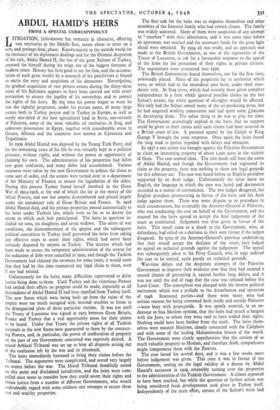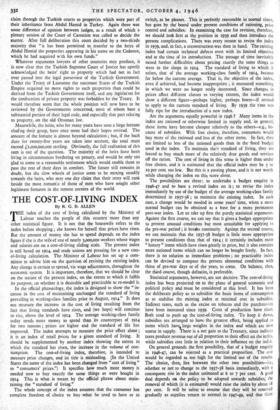ABDUL HAMID'S HEIRS
FROM A SPECIAL CORRESPONDENT
LITIGATION, little-known but romantic in character, affecting vast territories in the Middle East, seems about to enter on a new, and perhaps final, phase. Known mainly to the outside world for the intricacy of his diplomatic dealings and for the Oriental despotism of his rule, Abdul Hamid II, the last of the great Sultans of Turkey, amassed for himself during his reign one of the biggest fortunes of modern times. History has little good to say for him, and the accumu- lation of such great wealth by a monarch of his proclivities is bound to excite the envy and suspicions of his detractors. Nevertheless, the gradual acquisition of vast private estates during the thirty-three years of his Sultanate appears to have been carried out with every precaution to ensure the legality of his ownership, and to protect the rights of his heirs. By the time his power began to wane he was the rightful proprietor, under his private name, of many large estates both in Turkey proper and in Turkey in Europe, as well as nearly one-third of the best agricultural land in Syria, one-seventh of Palestine, some of the most valuable oil territories in Iraq, and unknown possessions in Egypt, together with considerable areas in Greece, Albania and the countries now known as Cyrenaica and Tripolitania.
In 1909 Abdul Hamid was deposed by the Young Turk Party, and for the remaining years of his life he was virtually kept as a political prisoner, without rights, and without the power or opportunity of claiming his own. The administration of his properties had fallen into great confusion, and many debts had accumulated. Various measures were taken by the new Government to ;educe the chaos to some sort of order, and the estates were turned over to a department of the Ministry of Finance to ensure the liquidation of the debts. During this process Turkey found herself involved in the Great War of 1914-1918, at the end of which she lay at the mercy of the Allied Powers, and saw her empire dismembered and placed largely under the mandatory rule of Great Britain and France. In 1918 Abdul Hamid died, and his private properties passed automatically to his heirs under Turkish law, which went so far as to decree the extent to which each heir participated. The heirs in question in- cluded six sons, six daughters and seven widows. The stress of war conditions, the dismemberment of the ejnpire and the subsequent political convulsion in Turkey itself prevented the heirs from taking any effective steps to assert their rights, which had never been seriously disputed by anyone in Turkey. The decrees which had been made to secure the temporary administration of the estates for the reduction of debt were cancelled in 192o, and though the Turkish Government had claimed the revenues for some years, it would seem that they had by this time renounced any legal claim to them, even if one had existed.
Unfortunately for the heirs, many difficulties supervened to delay justice being done to them. Until Turkey and the victorious Powers had settled their affairs no progress could be made, especially as all descendants of Abdul Hamid II had been expelled from Turkey itself. The new States which were being built up from the ruins of the empire were too much occupied with internal troubles to listen to the disorganised pleas of these particular victims. It was not until the Treaty of Lausanne was signed in 1923 between Great Britain, France and Turkey that a real opportunity arose for their claims to be heard. Under that Treaty the private rights of all Turkish nationals in the new States were guaranteed to them by the contract- ing Powers, and, in particular, the power of confiscation of property on the part of any Government concerned was expressly denied. A mixed Arbitral Tribunal was set up to hear all disputes arising out of the confusion left by the war and its aftermath.
The heirs immediately hastened to bring their claims before the Tribunal. The arguments were complicated, and rested very largely on events before the war. The Mixed Tribunal thankfully seized on this point and disclaimed jurisdiction, and the heirs were com- pelled once more to consider how they could assert their rights and obtain justice from a number of different Governments, who would undoubtedly regard with some coldness any attempts to secure these vast and wealthy properties. The first task for the heirs was to organise themselves and other members of the Imperial family who had certain claims. The family was widely scattered. Many of them were suspicious of any attempt to " interfere " with their inheritance, and it was some time before an agreement was reached and the necessary funds for the great fight ahead were obtained. By 1934 all was ready, and an approach was made to the British Government, as one of the signatories of the Treaty of Lausanne, to ask for a favourable response to the appeal of the heirs for the protection of their rights as private citizens. The negotiations were protracted into 1936.
The British Government found themselves, not for the first time, awkwardly placed. Many of the properties lay in territories which
were, or which had in the immediate past been, under their man- datory rule. In Iraq alone, which had recently been given complete independence in a form which ignored possible claims on the late Sultan's estates, the whole question of oil-rights would be affected. Not only had the Sultan owned many of the oil-producing areas, but he had acquired working concessions and had spent some £200,000 in developing them. The safest thing to do was to play for time. The Government accordingly replied to the heirs that no support could be given to their claims until such claims had been asserted in a British court of law. A personal appeal by the Caliph to King George V brought the same response. Once again the heirs found the long road to justice impeded with delays and obstacles.
In 1937 a test action was brought against the Palestine Government to claim an interesting property of about I,000 acres in the vicinity of Gaza. The case seemed clear. The title deeds still bore the name of Abdul Hamid, and though the Government had registered its claim to the property, there was nothing to show any legal grounds for this arbitrary act. The case was heard before an English president supported by an Arab judge. Unfortunately the latter knew no English, the language in which the case was heard and documents recorded as a matter of convenience. The two judges disagreed, the English president pronouncing in favour of the heirs and the Arab judge against them. There was sonic dispute as to procedure in such circumstances, but eventually the Attorney-General of Palestine, who was conducting the case on behalf of the Government, and the counsel for the heirs agreed to accept the final judgement of the court as constituted. Judgement was then given in favour of the heirs. This result came as a shock to the Government, who, as defendants, had relied on a decision in their own favour if the judges disagreed. In spite of the Attorney-General's previous undertaking that they would accept the decision of the court, they lodged an appeal on technical grounds against the judgement The appeal was subsequently taken to the Privy Council, who in 1941 ordered the case to be retried, again purely on technical grounds.
War-time delays and the desperate attempts of the Palestine Government to improve their evidence now that they had secured a second chance of presenting it, caused further long delays, and it was not until the end of 1945 that the case was reheard before the Land Court. The atmosphere was charged with the intense political excitement which was a prelude to the disturbances and terrorism of 1946. Interested parties—and there were many who had serious reasons for being interested both inside and outside Palestine —were busy with propaganda. It was openly asserted, in an en- deavour to bias Moslem opinion, that the heirs had struck a bargain with the Jews, to whom they were said to have traded their rights. Nothing could have been further from the truth. The heirs them- selves were staunch Moslems, closely connected with the Caliphate and with some of the leading Mohammedan houses of the world. The Government were clearly apprehensive that the cession of so much valuable property to Moslem, and therefore Arab, sympathisers might compromise them with the Zionists.
The case lasted for several days, and it was a few weeks more before judgement was given. This time it was in favour of the Government, resting on the legal validity of a decree by Abdul Hamid's successor in 1909, ostensibly turning over the properties to the administration of the Turkish Government. A climax appeared to have been reached, but while the question of further action was being considered fresh developments took place in Turkey itself. Independently of the main effort, certain of the Sultan's heirs laid claim through the Turkish courts to properties which were part of their inheritance from Abdul Hamid in Turkey. Again there was some difference of opinion between judges, as a result of which a plenary session of the Court of Cassation was called to decide the matter. After full deliberation this court decided by a two-thirds majority that " it has been permitted to transfer to the heirs of Abdul Hamid the properties appearing in his name on the Cadastre, which he had acquired with his own funds."
Whatever arguments lawyers of other countries may produce, it is now clear that the Turkish Supreme Court of Justice has openly acknowledged the heirs' right to property which had not in fact ever passed into the legal possession of the Turkish Government. Under the Treaty of Lausanne the successor States of the Turkish Empire acquired no more rights to such properties than could be derived from the Turkish Government itself, and any legislation for the confiscation of private property was forbidden by the Treaty. It would therefore seem that the whole position will now have to be reviewed by the Governments concerned, most of whom base a substantial portion of their legal code, and especially that part relating to property, on the old Ottoman law.
Meanwhile, the heirs, who for many years have seen a large fortune eluding their grasp, have once more had their hopes revived. The amount of the fortune is almost beyond calculation ; but, if the back dues for twenty-five years are taken into account, the total must exceed Li,000,000,000 sterling. Obviously, the full realisation of this sum is out of the question. The majority of the heirs have been living in circumstances bordering on penury, and would be only too glad to come to a reasonable settlement which would enable them to pass the rest of their days in comfort. The future still remains in doubt, but the slow wheels of justice seem to be moving steadily towards the heirs, who may one day claim that their story will rank beside the most romantic of those of men who have sought other legitimate fortunes in the remote corners of the world.































 Previous page
Previous page